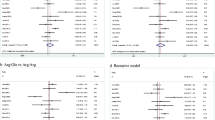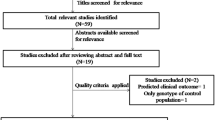Abstract
Purpose
Studies on polymorphism of X-ray repair cross-complementing group 1 (XRCC1), group 3 (XRCC3), and colorectal cancer risk are inconclusive. The purpose of this study is to evaluate the role of XRCC1 R399Q, R194W, and XRCC3 T241M genotypes in colorectal cancer susceptibility.
Methods
We performed a meta-analysis on all available studies that provided 3,514/4,686 cases/controls for R399Q, 2,767/3,907 cases/controls for R194W and 3,183/3,926 cases/controls for T241M.
Results
Overall, no apparent effects of 194 W allele compared to 194R on colorectal cancer risk were found in all subjects and subgroups (Asians and Caucasians). Insignificant effects were also found under other genetic contrasts (homologous contrast, dominant model, and recessive model). The same pattern of results was produced in T241M polymorphism. The 399Q allele compared to 399R showed no significant association with colorectal cancer risk in all subjects and subgroups. However, protective effects of 399QQ genotype were observed under recessive model (QQ/QR + RR) [P = 0.02, OR = 0.84, 95% CI (0.72, 0.97)] and homozygote contrast (QQ/RR) [P = 0.01, OR = 0.81; 95% CI (0.69, 0.95)] in all subjects.
Conclusion
Results suggested that 399Q allele might act as a recessive allele in its association with colorectal cancer.




Similar content being viewed by others
References
Chambers AF, Groom AC, Macdonald IC (2002) Dissemination and growth of cancer cells in metastatic sites. Nat Rev Cancer 2:563–572
Doll R, Peto R (1981) The causes of cancer: quantitative estimatesof avoidable risks of cancer in the United States today. J NatlCancer Inst 66:1191–1308
Thomas HJ (1993) Familial colorectal cancer. Br Med J 307:277–278
Vineis G, Talaska C, Malaveille H, Bartsch T, Martone P, Sithisarankul P, Strickland (1996) DNA adducts in urothelialcells: relationship with biomarkers of exposure to arylaminesand polycyclic aromatic hydrocarbons from tobacco smoke. Int J Cancer 65:314–316
Lunn RM, Langlois RG, Hsieh LL, Thompson CL, Bell DA (1999) XRCC1 polymorphisms: effects on aflatoxin B1-DNA adducts and glycophorin A variant frequency. Cancer Res 59:2557–2561
Hou SM, Falt S, Angelini S, Yang K, Nyberg F, Lambert B, Hemminki K (2002) The XPD variant alleles areassociated with increased aromatic DNA adduct level and lungcancer risk. Carcinogenesis 23:599–603
Matullo G, Guarrera S, Carturan S, Peluso M, Malaveille C, Davico L, Piazza A, Vineis P (2001) DNA repair gene polymorphisms, bulky DNA adducts in white blood cells and bladdercancer in a case-control study. Int J Cancer 92:562–567
Liu G, Zhou W, Christiani DC (2005) Molecular epidemiology of non-small cell lung cancer. Semin Respir Crit Care Med 26:265–272
Caldecott KW, Aoufouchi S, Johnson P, Shall S (1996) XRCC1polypeptide interacts with DNA polymerase beta and possiblypoly (ADP-ribose) polymerase, and DNA ligase III is a novelmolecular "nick-sensor" in vitro. Nucleic Acids Res 24:4387–4394
Kubota Y, Nash RA, Klungland A, Schar P, Barnes DE, Lindahl T (1996) Reconstitution of DNA base excision-repair withpurified human proteins: interaction between DNA polymerasebeta and the XRCC1 protein. Eur Mol Biol Org J 15:6662–6670
Cappelli E, Taylor R, Cevasco M, Abbondandolo A, Caldecott K, Frosina G (1997) Involvement of XRCC1 and DNAligase III gene products in DNA base excision repair. J Biol Chem 272:23970–23975
Tebbs RS, Zhao Y, Tucker JD, Scheerer JB, Siciliano MJ, Hwang M, Liu N, Legerski RJ, Thompson LH (1995) Correction of chromosomal instability andsensitivity to diverse mutagens by a cloned cDNA of theXRCC3 DNA repair gene. Proc Natl Acad Sci USA 92:6354–6358
Shen MR, Jones IM, Mohrensweiser H (1998) Nonconservative amino acid substitution variants exist at polymorphic frequency in DNA repair in healthy humans. Cancer Res 58:604–608
Goode EL, Ulrich CM, Potter JD (2002) Polymorphisms in DNArepair genes and associations with cancer risk. CancerEpidemiol Biomark Prev 11:1513–1530
Masson M, Niedergang C, Schreiber V, Muller S, Menissier-deMurcia J, de Murcia G (1998) XRCC1 is specifically associated with poly(ADP-ribos polymerase and negatively regulates its activity following DNA damage. Mol Cell Biol 18:3563–3571
Relton CL, Daniel CP, Fisher A, Chase DS, Burn J, Tawn EJ (2002) Polymorphism of the DNA repair gene XRCC1 and the frequency of somatic mutations at the glycophorin A locus in newborns. Mutat Res 502:61–68
Fan J, Otterlei M, Wong HK, Tomkinson AE, Wilson DM 3rd (2004) XRCC1 co-localizes and physically interacts with PCNA. Nucleic Acids Res 32:2193–2201
Abdel-Rahman SZ, Soliman AS, Bondy ML, Omar S, El-Badawy SA, Khaled HM, Seifeldin IA (2000) Levin B Inheritance of the 194Trp and the 399Gln variant alleles of the DNA repair gene XRCC1 are associated with increased risk of early onset colorectal carcinoma in Egypt. Cancer Lett 159:79–86
Mort R, Mo L, McEwan C, Melton DW (2003) Lack of involvement of nucleotide excision repair gene polymorphisms in colorectal cancer. Br J Cancer 89:333–337
Krupa R, Blasiak J (2004) An association of polymorphism of DNA repair genes XRCC1 and XRCC3 with colorectal cancer. J Exp Clin Cancer Res 23:285–294
Skjelbred CF, Saebø M, Wallin H, Nexø BA, Hagen PC, Lothe IM, Aase S, Johnson E, Hansteen IL, Vogel U, Kure EH (2006) Polymorphisms of the XRCC1, XRCC3 and XPD genes and risk of colorectal adenoma and carcinoma, in a Norwegian cohort: a case control study. BMC Cancer 6:67
Improta G, Sgambato A, Bianchino G, Zupa A, Grieco V, La Torre G, Traficante A, Cittadini A (2008) Polymorphisms of the DNA repair genes XRCC1 and XRCC3 and risk of lung and colorectal cancer: a case-control study in a Southern Italian population. Anticancer Res 28:2941–2946
** MJ, Chen K, Song L, Fan CH, Chen Q, Zhu YM, Ma XY, Yao KY (2005) The association of the DNA repair gene XRCC3 Thr241Met polymorphism with susceptibility to colorectal cancer in a Chinese population. Cancer Genet Cytogenet 163:38–43
Woolf B (1955) On estimating the relation between blood group and disease. Ann Hum Genet 19:251–253
Lau J, Ioannidis JP, Schmid CH (1997) Quantitative synthesis in systematicreviews. Ann Intern Med 127:820–826
Higgins JPT, Thompson SG, Deek JJ, Altman DG (2003) Measuring inconsistency in meta-analyses. BMJ 327:557–560
Egger M, Davey SG, Schneider M, Minder (1997) Bias in metaanalysis detected by a simple, graphical test. BMJ 315:629–634
Sliwinski T, Krupa R, Wisniewska-Jarosinska M, Lech J, Morawiec Z, Chojnacki J, Blasiak J (2008) No association between the Arg194Trp and Arg399Gln polymorphisms of the XRCC1 gene and colorectal cancer risk and progression in a Polish population. Exp Oncol 30:253–254
Tranah GJ, Giovannucci E, Ma J, Fuchs C, Hankinson SE, Hunter DJ (2004) XRCC2 and XRCC3 polymorphisms are not associated with risk of colorectal adenoma. Cancer Epidemiol Biomarkers Prev 13:1090–1091
Moreno V, Gemignani F, Landi S, Gioia-Patricola L, Chabrier A, Blanco I, González S, Guino E, Capellà G, Canzian F (2006) Polymorphisms in genes of nucleotide and base excision repair: risk and prognosis of colorectal cancer. Clin Cancer Res 12:2101–2108
Yeh CC, Sung FC, Tang R, Chang-Chieh CR, Hsieh LL (2005) Polymorphisms of the XRCC1, XRCC3, & XPD genes, and colorectal cancer risk: a case-control study in Taiwan. BMC Cancer 5:12
Hong YC, Lee KH, Kim WC, Choi SK, Woo ZH, Shin SK, Kim H (2005) Polymorphisms of XRCC1 gene, alcohol consumption and colorectal cancer. Int J Cancer 116:428–432
Stern MC, Conti DV, Siegmund KD, Corral R, Yuan JM, Koh WP, Yu MC (2007) DNA repair single-nucleotide polymorphisms in colorectal cancer and their role as modifiers of the effect of cigarette smoking and alcohol in the Singapore Chinese Health Study. Cancer Epidemiol Biomarkers Prev 16:2363–2372
Stern MC, Siegmund KD, Corral R, Haile RW (2005) XRCC1 and XRCC3 polymorphisms and their role as effect modifiers of unsaturated fatty acids and antioxidant intake on colorectal adenomas risk. Cancer Epidemiol Biomarkers Prev 14:609–615
Berndt SI, Huang WY, Fallin MD, Helzlsouer KJ, Platz EA, Weissfeld JL, Church TR, Welch R, Chanock SJ, Hayes RB (2007) Genetic variation in base excision repair genes and the prevalence of advanced colorectal adenoma. Cancer Res 67:1395–1404
Nelson HH, Kelsey KT, Mott LA, Karagas MR (2002) The XRCC1 Arg399Gln polymorphism, sunburn and non-melanoma skin cancer: evidence of gene-environment interaction. Cancer Res 62:152–155
Ladiges W, Wiley J, MacAuley A (2003) Polymorphisms in the DNA repair gene XRCC1 and age-related disease. Mech Ageing Dev 124:27–32
David-Beabes GL, London SJ (2001) Genetic polymorphism of XRCC1 and lung cancer risk among African-American and Caucasian. Lung Cancer 34:333–339
Seedhouse C, Bainton R, Lewis M, Harding A, Russell N, Das-Gupta E (2002) The genotype distribution of the XRCC1 gene indicates a role for base excision repair in the development of therapy-related acute myeloblastic leukemia. Blood 100:3761–3766
Van Gils CH, Bostick RM, Stern MC, Taylor JA (2002) Differences in base excision repair capacity may modulate the effect of dietaryantioxidant intake on prostate cancer risk: an example of polymorphisms in the XRCC1 gene. Cancer Epidemiol Biomarkers Prev 11:1279–1284
Misra RR, Ratnasinghe D, Tangrea JA, Virtamo J, Andersen MR, Barrett M, Taylor PR, Albanes D (2003) Polymorphisms in the DNA repair genes XPD, XRCC1, XRCC3, and APE/ref-1, and the risk of lung cancer among male smokers in Finland. Cancer Lett 91:171–178
Zhou W, Liu G, Miller DP, Thurston SW, Xu LL, Wain JC, Lynch TJ, Su L, Christiani DC (2003) Polymorphisms in the DNA Repair Genes XRCC1 and ERCC2, Smoking, and Lung Cancer Risk. Cancer Epidemiol Biomarkers Prev 12:359–365
Stern MC, Umbach DM, van Gils CH, Lunn RM, Taylor JA (2001) DNA repair gene XRCC1 polymorphisms, smoking, and bladder cancer risk. Cancer Epidemiol Biomarkers Prev 10:125–131
Sanderson RJ, Mosbaugh DW (1998) Fidelity and mutational specificity of uracilinitiated base excision DNA repair synthesis in human glioblastoma cell extracts. J Biol Chem 273:24822–24831
Naccarati A, Pardini B, Hemminki K, Vodicka P (2007) Sporadic colorectal cancer and individual susceptibility: a review of the association studies investigating the role of DNA repair genetic polymorphisms. Mutat Res 635:118–145
Author information
Authors and Affiliations
Corresponding author
Rights and permissions
About this article
Cite this article
Jiang, Z., Li, C., Xu, Y. et al. A meta-analysis on XRCC1 and XRCC3 polymorphisms and colorectal cancer risk. Int J Colorectal Dis 25, 169–180 (2010). https://doi.org/10.1007/s00384-009-0817-9
Accepted:
Published:
Issue Date:
DOI: https://doi.org/10.1007/s00384-009-0817-9




